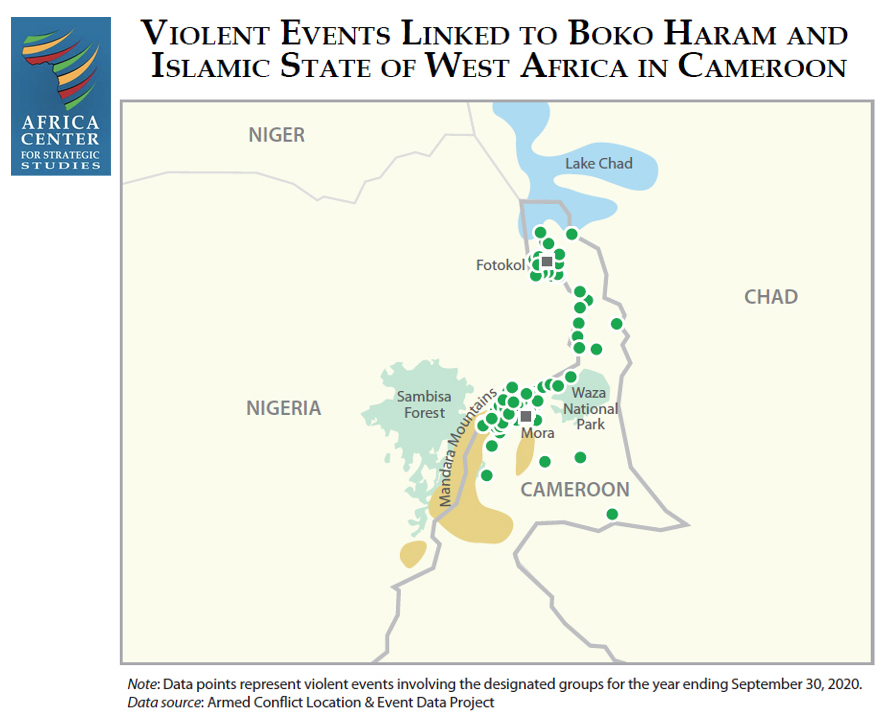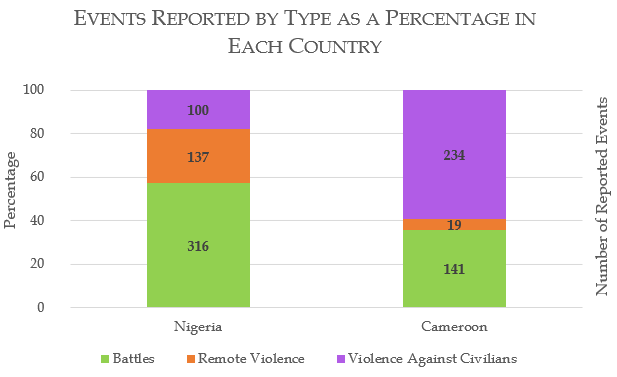- The number of violent incidents linked to militant Islamist groups in Cameroon’s Far North Region jumped 90 percent, to roughly 400 events, over the past 12 months. This compares to a 52-percent increase in Nigeria, the epicenter of the insurgency.
- The spike of violence in the Far North coincides with an increase in battles between militant Islamist groups and Nigerian security forces on the Nigerian side of the border. The increased pressure in Nigeria has most likely forced these militants into Cameroon, underscoring the regional dimensions of this security threat.
- Boko Haram has been moving through the Mandara Mountain range into the area surrounding Mora. Further north, the Boko Haram splinter group, the Islamic State of West Africa, is simultaneously moving into the area around the Chadian border near Fotokol.
- Most of the violence reported in Cameroon has been in the form of attacks against civilians (over 59 percent). The number of attacks against civilians in Cameroon over the last 12 months (234) is higher than in Nigeria (100), Niger (92), and Chad (12) combined. These attacks consist of Boko Haram raids, kidnapping for recruitment and ransom, and looting of villages and displaced persons camps.
- These attacks have led to new population displacements within Cameroon, bringing the total number of internally displaced Cameroonians in the Far North region to 321,900. Since the militant Islamist violence began, Cameroon has suffered more than 5,000 fatalities in this region.
- Cameroon’s military has been primarily focused on the Anglophone separatist movement in the West, treating the Boko Haram insurgency as a “cross-border menace.” Though the government has committed some troops to protect the Far North Region, it relies on vigilance committees and civilians as the first line of defense for the affected villages. This has made these communities soft targets for Boko Haram.
- Without better and sustained coordination among the governments in the region and through the Multinational Joint Task Force, Cameroon will likely see the Boko Haram threat continue to expand.
Additional Resources
- Africa Center for Strategic Studies, “African Militant Islamist Groups Set Record for Violent Activity,” Infographic, July 21, 2020.
- Daniel Eizenga, “Chad’s Escalating Fight Against Boko Haram,” Spotlight, April 20, 2020.
- Wendy Williams, “Shifting Borders: Africa’s Displacement Crisis and Its Security Implications,” Africa Center Research Paper No. 8, Africa Center for Strategic Studies, October, 2019.
- Africa Center for Strategic Studies, “Security Priorities for the New Nigerian Government,” Spotlight, February 25, 2019.
- Africa Center for Strategic Studies, “Growing Instability in Cameroon Raises Fundamental Questions about the State,” Spotlight, October 26, 2018.
- Chris Fomunyoh, “Understanding Cameroon’s Crisis of Governance,” Video, Africa Center for Strategic Studies, December 11, 2017.
- Michael Sodipo, “Mitigating Radicalism in Northern Nigeria,” Africa Security Brief No. 26, Africa Center for Strategic Studies, August 2013.
- J. Peter Pham, “Boko Haram’s Evolving Threat,” Africa Security Brief No. 20, Africa Center for Strategic Studies, April 2012
More on: Boko Haram Cameroon Islamic State




